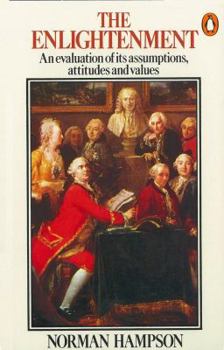The Enlightenment
Select Format
Select Condition 
Book Overview
Armed with the insights of the scientific revolution, the men of the Enlightenment set out to free mankind from its age-old cocoon of pessimism and superstition and establish a more reasonable world of experiment and progress. Yet by the 1760s, this optimism about man and society had almost evaporated. In the works of Rousseau, Kant and Goethe, there was discernible a new inner voice, and an awareness of individual uniqueness which had eluded their...
Format:Paperback
Language:English
ISBN:0140137459
ISBN13:9780140137453
Release Date:February 1991
Publisher:Penguin Group
Length:304 Pages
Weight:0.40 lbs.
Dimensions:0.6" x 5.1" x 7.8"
Related Subjects
Americas Europe History Modern Renaissance Philosophy Politics & Social Sciences WorldCustomer Reviews
2 ratings
A good introduction to the thinkers of the age
Published by Thriftbooks.com User , 19 years ago
Hampson's treatment of the Enlightenment is encyclopedic as he attempts to show it as the intellectual foundation of modern thought. In this, he succeeds. As a previous reviewer noted, Hampson also attempts to encourage the reader to take on the acutal sources by the thinkers themselves. In this, he misses his mark. The book is divided into two sections: 1715 - 1740 and 1740 - 1789. The first half looks at the effects of the Scientific Revolution on European thought with specific attention given to Locke, Newton, Montesquieu and Voltaire; the second half examines Linneaus, Rousseau, Diderot, Smith and Kant. His summary and observations of these intellecutals is excellent - which, of course makes it difficult to convince readers to tackle their work first-hand. It is not light reading, geared probably towards the serious student of history. But is is worthwhile, and it may in fact whet the reader's appetite for more.
Nice introduction to the Enlightenment
Published by Thriftbooks.com User , 24 years ago
In this book, prof. Hampson attempts to discuss a number of very diverse topics within the movement of the Enlightenment. This makes the book very interesting but perhaps also unclear in the purpose of the chosen structure and the subjects of the book. Because it tries to span the entire 18th century in only 300 or so pages, it is bound to run into unhelpful generalisations and creating a lack of coherence of the general subject discussed. Yet the book supplies some interesting insights into the Enlightenment not found elsewhere. However, for those looking for the broader historical view of the period of the Enlightenment, I would recommend turning to W. and A. Durant's "The Age of Voltaire" and "Rousseau and Revolution", which are huge but exhaustive in historical background, while for the philosophical perspective, one should turn to Peter Gay's "The Enlightenment, an Interpretation". Thus, Hampson's book is a good starting point, but not much more than that I'm afraid.






